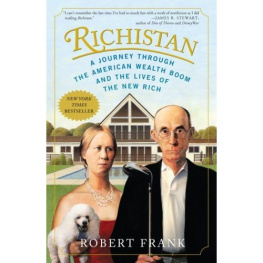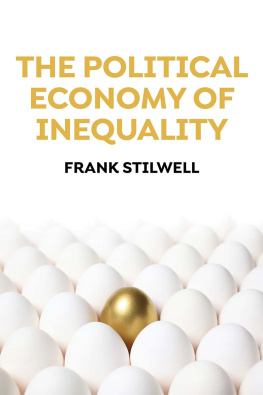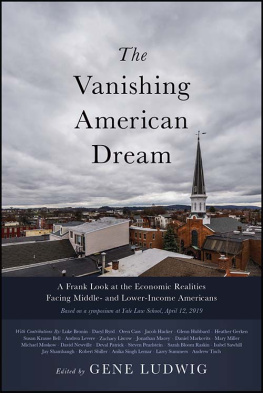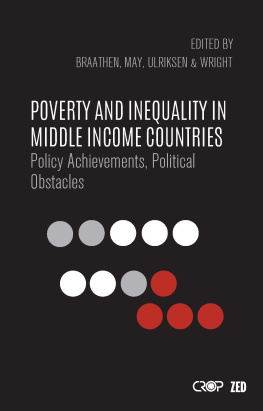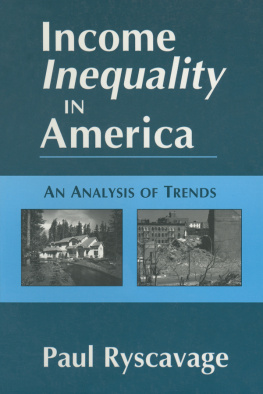
Praise for Robert Franks Falling Behind
Ive been a skeptic. Bob Frank is persistent. Hes beginning to convince me.
Thomas C. Schelling, author of The Strategy of Conflict and 2005 Nobel Laureate in Economics
In this century, distributional concerns will top the policy agenda. This masterful essay will change how you think about them.
Paul Romer, Stanford University
The arguments here are powerful and multidisciplinary. The crux is explaining how rising economic inequality causes harm to the middle class.... This is a gem of a book.
Lee S. Friedman, Professor of Public Policy, University of California, Berkeley
In this lively, provocative book filled with memorable new examples, Bob Frank goes beyond his previous work (Luxury Fever, Winner-Take-All Society, and Choosing the Right Pond) and clarifies that falling behind is a consequence not of envy but rather of the simple fact that a persons evaluation of his own possessions depends always and everywhere on contextan unconscious comparison with his neighbors possessions or with his own previous possessions.
Laurence Seidman, Chaplin Tyler Professor of Economics, University of Delaware
Copyright 2013. University of California Press. All rights reserved. May not be reproduced in any form without permission from the publisher, except fair uses permitted under U.S. or applicable copyright law.
EBSCO Publishing : eBook Collection (EBSCOhost) - printed on 12/4/2022 5:35 PM via
AN: 630088 ; Robert Frank.; Falling Behind : How Rising Inequality Harms the Middle Class
Account: ns075055
Falling Behind
EBSCOhost - printed on 12/4/2022 5:35 PM via . All use subject to https://www.ebsco.com/terms-of-use
THE AARON WILDAVSKY FORUM FOR PUBLIC POLICY
Edited by Lee Friedman
This series is intended to sustain the intellectual excitement that Aaron Wildavsky created for scholars of public policy everywhere. The ideas in each volume are initially presented and discussed at a public lecture and forum held at the University of California.
AARON WILDAVSKY, 19301993
Your prolific pen has brought real politics to the study of budgeting, to the analysis of myriad public policies, and to the discovery of the values underlying the political cultures by which peoples live. You have improved every institution with which you have been associated, notably Berkeleys Graduate School of Public Policy, which as Founding Dean you quickened with your restless innovative energy. Advocate of freedom, mentor to policy analysts everywhere. (Yale University, May 1993, from text granting the honorary degree of Doctor of Social Science)
Missing Persons: A Critique of Personhood in the Social Sciences, by Mary Douglas and Steven Ney
The Bridge over the Racial Divide: Rising Inequality and Coalition Politics, by William Julius Wilson
The New Public Management: Improving Research and Policy Dialogue, by Michael Barzelay
Falling Behind: How Rising Inequality Harms the Middle Class, by Robert H. Frank
Godly Republic: A Centrist Civic Blueprint for Americas Faith-Based Future, by John J. DiIulio, Jr.
Bounded Rationality and Politics, by Jonathan Bendor
Taxing the Poor: Doing Damage to the Truly Disadvantaged, by Katherine S. Newman and Rourke L. OBrien
Changing Inequality, by Rebecca M. Blank
EBSCOhost - printed on 12/4/2022 5:35 PM via . All use subject to https://www.ebsco.com/terms-of-use
Falling Behind
How Rising Inequality
Harms the Middle Class
Robert H. Frank
WITH A NEW PREFACE

UNIVERSITY OF CALIFORNIA PRESS
BerkeleyLos AngelesLondon
EBSCOhost - printed on 12/4/2022 5:35 PM via . All use subject to https://www.ebsco.com/terms-of-use
University of California Press, one of the most distinguished university presses in the United States, enriches lives around die world by advancing scholarship in the humanities, social sciences, and natural sciences. Its activities are supported by the UC Press Foundation and by philanthropic contributions from individuals and institutions. For more information, visit www.ucpress.edu.
University of California Press
Berkeley and Los Angeles, California
University of California Press, Ltd.
London, England
2007, 2013 by The Regents of the University of California
ISBN 978-0-520-28052-6
eISBN 9780520957435
The Library of Congress has cataloged an earlier edition of this book as follows:
Library of Congress Cataloging-in-Publication Data
Frank, Robert H.
Falling behind : how rising inequality harms the middle class / Robert II. Frank
p.cm.
Includes bibliographical references and index.
ISBN 978-0-520-25188-5 (cloth : alk. paper)
ISBN 978-0-520-25252-3 (pbk. : alk. paper)
1. Middle classUnited StatesEconomic conditions.2. Income distributionUnited States.3. Consumption (Economics)United States.4. EqualityEconomic aspectsUnited States.I. Tide.
HT690.U6F732007
305-550973dc22
2006026248
Manufactured in the United States of America
22 21 20 19 18 17 16 15 14 13
10 9 8 7 6 5 4 3 2 1
In keeping with a commitment to support environmentally responsible and sustainable printing practices, UC Press has printed this book on Rolland Enviro100, a 100% post-consumer fiber paper that is FSC certified, deinked, processed chlorine-free, and manufactured with renewable biogas energy. It is acid-free and EcoLogo certified.
EBSCOhost - printed on 12/4/2022 5:35 PM via . All use subject to https://www.ebsco.com/terms-of-use
CONTENTS
EBSCOhost - printed on 12/4/2022 5:35 PM via . All use subject to https://www.ebsco.com/terms-of-use
PREFACE TO THE 2013 EDITION
Falling Behind was first published in 2007. Its central thesis is that the rapid growth in income and wealth inequality that began in the early 1970s caused substantial economic damage to middle-income families.
I was grateful for the invitation from University of California Press to reflect on the basic message of Falling Behind in the light of events since then. Did the financial crisis and the ensuing Great Recession cast doubt on my thesis?
In a word, no. But its a fair question, since those events did upend the inequality trends at issue. Prior to the early 1970s, incomes had been growing at about the same rate for about three decadesslightly less than 3 percent annuallyfor families at all income levels. Between the early 1970s and 2007, however, almost all significant income gains in the United States were confined to the top quintile of the earnings distribution, and even those gains themselves were heavily concentrated among the top 1 percent.
The salaries of CEOs of large American corporations, for instance, were roughly forty times those of the average worker in 1980, but by 2000 the multiple had risen to more than five hundred.
The financial crisis of 2008 and the ensuing Great Recession of course produced significant hardship for almost everyone. But the greatest losses, in proportional terms, were actually to those at the top of the economic pyramid, because of the steep declines they experienced in their financial wealth holdings. Many have described stock ownership as highly diffuse in the United States, and that is true relative to many other countries, but stock ownership in the U.S. remains highly concentrated. In 2007, the top 1 percent owned more than 42 percent of the countrys total financial wealth.
Next page

